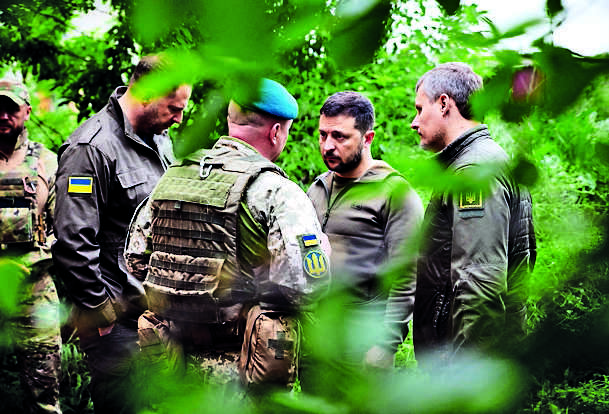Russia‘s military said onTuesday that it crushed what appeared to be one of the most serious cross-border attacks from Ukraine since the war began, claiming to have killed more than 70 attackers in a battle that lasted around 24 hours. Moscow blamed the raid that began Monday on Ukrainian military saboteurs. Kyiv portrayed it as an uprising against the Kremlin by Russian partisans. It was impossible to reconcile the two versions to say with certainty who was behind the attack or to ascertain its aims
The battle – which took place in southwest Russia’s Belgorod region, about 80 kilometers north of the city of Kharkiv, in eastern Ukraine – was a fresh reminder of how Russia itself remains vulnerable to attack, in addition to Russian-occupied regions of Ukraine. The region is a Russian military hub holding fuel and ammunition depots and was included in Russian President Vladimir Putin‘s order last year to increase the state of readiness for attacks and improve defenses.
The Russian military said it had killed more than 70 “Ukrainian nationalists” and destroyed four armoured vehicles. There was no independent confirmation of those losses. Russian forces had surrounded the enemy fighters and defeated them with “air strikes, artillery fire and active action by border units”, the defence ministry said. “The remnants of the nationalists were pushed back to Ukrainian territory, where they continued to be hit by gunfire until they were completely eliminated,” it added. He did not mention any Russian casualties.
Kyiv publicly denied blame for the raid. A deputy Ukrainian defence minister, Hanna Maliar, described the attackers as “Russian patriots” who “rebelled against the Putin regime.” The two groups who claimed responsibility, the Freedom of Russia Legion and the Russian Volunteer Corps, both say they comprise armed Russian fighters seeking to overthrow President Putin. The Legion says it is recognised by Ukraine and its members have fought there against Russia. The RVC has claimed responsibility for previous attacks inside Russia, including a cross-border raid in the neighbouring Bryansk region in March. Asked about reports that the attackers were ethnic Russians, Kremlin spokesman Dmitry Peskov said: “They are Ukrainian fighters from Ukraine. There are many ethnic Russians living in Ukraine. But they are still Ukrainian militants.”
The battle – which took place in southwest Russia’s Belgorod region, about 80 kilometers north of the city of Kharkiv, in eastern Ukraine – was a fresh reminder of how Russia itself remains vulnerable to attack, in addition to Russian-occupied regions of Ukraine. The region is a Russian military hub holding fuel and ammunition depots and was included in Russian President Vladimir Putin‘s order last year to increase the state of readiness for attacks and improve defenses.
The Russian military said it had killed more than 70 “Ukrainian nationalists” and destroyed four armoured vehicles. There was no independent confirmation of those losses. Russian forces had surrounded the enemy fighters and defeated them with “air strikes, artillery fire and active action by border units”, the defence ministry said. “The remnants of the nationalists were pushed back to Ukrainian territory, where they continued to be hit by gunfire until they were completely eliminated,” it added. He did not mention any Russian casualties.
Kyiv publicly denied blame for the raid. A deputy Ukrainian defence minister, Hanna Maliar, described the attackers as “Russian patriots” who “rebelled against the Putin regime.” The two groups who claimed responsibility, the Freedom of Russia Legion and the Russian Volunteer Corps, both say they comprise armed Russian fighters seeking to overthrow President Putin. The Legion says it is recognised by Ukraine and its members have fought there against Russia. The RVC has claimed responsibility for previous attacks inside Russia, including a cross-border raid in the neighbouring Bryansk region in March. Asked about reports that the attackers were ethnic Russians, Kremlin spokesman Dmitry Peskov said: “They are Ukrainian fighters from Ukraine. There are many ethnic Russians living in Ukraine. But they are still Ukrainian militants.”
